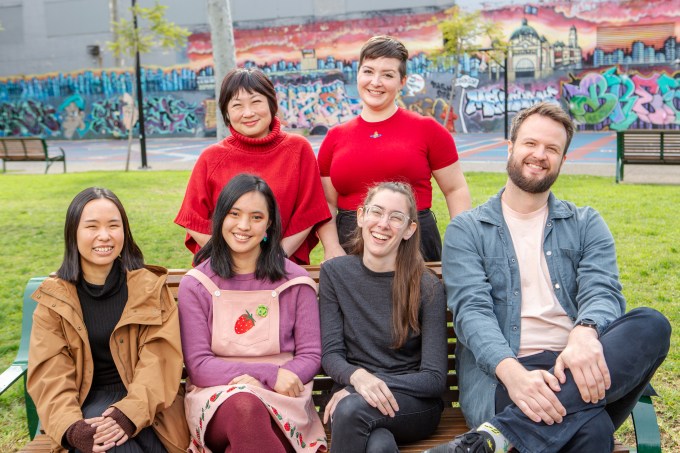Mobile well-being apps were on track to top a billion downloads last year, while leading meditation app Calm alone pulled in $118.2 million in revenue, data from Sensor Tower indicates. That may leave some to believe the digital well-being market is essentially solved, but a new startup, Lumi Interactive, believes the opposite is true. The Melbourne-based, women-led company has identified a under-explored niche in the mobile market which involves translating offline, self-care activities into games as a means of reducing our collective stress and anxiety.
While most mobile games focus on having users compete against one another or achieve some sort of goal, the startup’s forthcoming title, Kinder World’s main aim is to help users relax. It accomplishes this through short, snack-sized sessions where it asks players to care for virtual houseplants by taking care of themselves in the real world.
In the game, players are encouraged to perform simple acts of kindness — like practicing daily gratitude, for example — in order to improve their own well-being and that of the game’s wider community. The game features a variety of non-stressful activities — like watering houseplants, interacting with animal neighbors, and decorating a cozy room with plants, among other things.

Image Credits: Lumi Interactive
In some ways, this recalls how many of us spent months in creative play during the height of the pandemic engaged with games like Animal Crossing, the popular Nintendo game whose pressure-free environment helped many relax and pass the time under Covid-19 lockdowns. In Animal Crossing, players designed indoor and outdoor spaces, shopped for outfits and home accessories, planted flowers, and chit-chatted with animal pals.
As it turns out, the pandemic played a big role in Lumi Interactive’s founding, too, the company told TC.
“In late 2020, we were a small team of three, exhausted by the pandemic and a hard year for the business,” explains Lumi Interactive co-founder and CEO Lauren Clinnick. “We decided to take two weeks to refresh ourselves with a game jam to make something totally new, and mental well-being was very much on our minds. We’d also all become closer to nature over the harsh Melbourne lockdowns, and wanted to examine why houseplants had become part of a self-care routine for so many people we knew,” she says.
That gave rise to a question as to whether houseplant care could be brought into the digital world, and the team prototyped Kinder World as a result.
“It had a spark of something special after just two weeks, and the concept tested very strongly with our target audience straight away,” Clinnick says.
Both Clinnick and Lumi Interactive co-founder Christina Chen had a background in gaming before founding their new company, and had known each other for nearly a decade. Clinnick first entered the games industry as a marketing consultant for games like Crossy Road, co-founded a boutique games marketing agency, then moved into direct games development. Chen, meanwhile, had a technical background that saw her working on payments at Xbox Live and later as a Senior Producer at PopCap in Shanghai, before co-founding games publisher Surprise Attack (now known as Fellow Traveller).
The duo had bonded over their mutual love for data, underserved player communities and the new opportunities they believed were still on the horizon for mobile gaming, Clinnick says.

Image Credits: Lumi Interactive
As the team investigated the idea for a more collaborative, self-care-focused title, they discovered that many of today’s consumers weren’t finding satisfaction with mainstream well-being apps.
“When we actually interviewed users — especially Gen Z and millennial women and nonbinary folks — we found that 97% had dropped out of apps like Headspace and Calm, citing they ‘felt like work’ or became another thing for them to fail at,” says Clinnick. “Instead they often have fragmented relaxation hobbies such as gaming, houseplants, Squishmallow collecting, crafting, and ASMR. These are mostly distraction activities that helped their short-term anxiety but didn’t help them build important resilience skills in the long-term,” she says.
Lumi Interactive responded to this feedback by making sure their game was designed in a way where you couldn’t fail, no matter how you played. For instance, all the activities in the game are optional and the virtual houseplants will never die.
“We’ve consciously made these choices to prevent a burdened feeling for players,” says Clinnick.
In keeping with a strategy to co-develop the game along with their community, the startup turned to TikTok to test various elements, like game design, the art style, and to find out what interested their users.
Now a full-time team of 12 and growing, Lumi Interactive closed on $6.75 million in seed funding in March in a round led by a16z — which it’s officially announcing this week. Other investors include 1Up Ventures, Galileo Ventures, Eric Seufert’s Heracles Capital and Double Loop Games’ co-founder and CEO, Emily Greer.
The startup is using the funds to grow the team so it can further develop the larger concept it calls “crowd healing,” informed by Lumi Interactive’s full-time well-being researcher, Dr. Hannah Gunderman, Ph.D. The company believes the idea — which references sharing kindness with others through self-care style gameplay — could become a new gaming category.
Lumi Interactive, of course, is not the first to imagine games that aren’t goal-focused. There are games that are interactive stories or graphic novels or other indie projects, but they often still have the gamer play through the experience to come to a conclusion. Kinder World, meanwhile, would be something players come back to whenever they need to relax, which is why the company is considering a subscription offering, in addition to standard in-app purchases. It’s also exploring online-offline experiences with physical items that could unlock certain game benefits or activities.
Kinder World is currently in alpha testing on iOS and Android and aims for a full release later in 2022.










